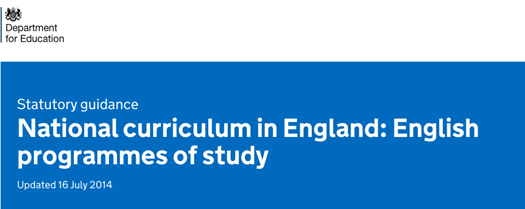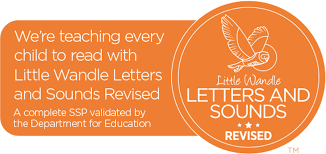English

Intent - The vision
At Holy Trinity Pewley Down, we want all children to have a love of reading and writing; and, in turn, for them to be avid readers and writers. “Embracing the future with hope and confidence”, we aim for children to enjoy writing, to see themselves as confident, competent writers, able to write for any given purpose or audience, and to be able to express their knowledge, ideas and emotions. Our literature spine is the glue that holds our English curriculum together, and, where possible, is linked to our topics to fully immerse the children in the foundation subjects. The rich texts selected offer rich exposure to language and experiences, challenging the children to “imagine the journey in another's footsteps”. The children not only enjoy and study these texts in reading, but also use them as a stimulus for their own writing.
Few impediments undermine a person’s aspirations as effectively as an inability to read. - National Literacy Trust
It is for this reason that our aim is for every child to leave HTPD as a reader. Not just one who can decode and then comprehend what they read, but one who loves to read, feels the benefit of reading and chooses to do so. With our exposure to rich and enjoyable texts and a grounding in an ability to decode and development of language and vocabulary in order to comprehend, every child can leave HTPD feeling that they are a reader and writer.
Implementation - How we achieve our goal?
English teaching and learning at HTPD follows the National Curriculum in England: English programmes of study and includes:
- Reading
- Writing
- Speaking
- Listening
Delivery of the curriculum is often closely linked to our topics, giving purpose to the children’s writing as well as ensuring they have a wide understanding and rich vocabulary and experiences to draw upon.
Early Reading and Phonics
Phonics is: making connections between the sounds of our spoken words and the letters that are used to write them down.
At HTPD, we follow the Little Wandle Letters and Sounds Systematic Synthetic Phonics (SSP) scheme to teach early reading. From their starting point in Reception, the children will start to segment words into the phonemes (sounds). Starting with the letter sounds: s,a,t,p,i,n, the children learn the grapheme: phoneme correspondence and then learn to blend.
Gradually throughout their time in Reception and Year 1, children learn the whole alphabetic code. We work our way through the whole of the Little Wandle Programme until each child can read fluently.
For some children, cracking the phonetic code may take longer, like learning to ride a bike does. At HTPD, all adults in the school are trained in delivering the programme, so that we can continue to work with individuals or groups who may need additional support to be decoding fluently as they move through the school.
Alongside their daily phonics lessons in Year 1 and 2, the children take part in reading practice sessions 3 times per week, reading a phonetically decodable book, which they then bring home to continue practising reading fluently at home.
The reading practice book
It is the school’s role to teach reading. However, parents/carers play a vital role, too. It is important that children have plenty of practice reading at home in order to become fluent, confident readers.
Parents’ or carers’ support is needed to help their child practise reading and develop fluency with a book they have already read at school. This book is matched to their phonic stage and is fully decodable. If books are sent home that the child cannot decode, it will lead to frustration for the child and for the parent/carer.
To ensure that reading at home is an enjoyable experience and does not feel like a chore, schools need to send home reading practice books in which the child can read 95% of the words. It does not have to be a different book every time; it may need to be the same book if the child still needs to develop fluency.
The sharing book
If children are to become lifelong readers, it is essential that they are encouraged to read for pleasure. The desire of wanting to read will help with the skill of reading. To help foster a love of reading, children will also take a book home that they can share and enjoy with their parent/carer.
The children will choose this book from the school library and these books offer a wealth of opportunities for talking about the pictures and enjoying the story. It is important to offer a variety of books, including non-fiction, so that they can enjoy a range of different texts.
Parents/carers need to understand that they should not expect their child to read this book independently and certainly should not try to force their child to do so. The book is for the parent/carer to read to or with the child. Again, it is good to talk about the book with the child, but important not to turn the discussion into a test. The goal is enjoyment.
- Little Wandle Letters and Sounds Programme Overview
- Little Wandle Letters and Sounds Glossary of Terminology
- Little Wandle Letters and Sounds for parents

Reading
At HTPD, we highly value the importance of reading as a child’s ability to read is often an indicator of their success in life. Reading has two components: word recognition and language comprehension. We aim to ensure that the children have the ability to decode and read with fluency. We recognise the importance for the children to reach a level of fluency of above 90 words correct per minute, which is necessary for the text to be understood. We develop reading fluency as a class, taking every opportunity across our curriculum to learn new knowledge through reading (and then re-reading for further fluency), followed by discussion and development of comprehension alongside.
Reading for pleasure has many non-literacy benefits and can increase empathy, improve relationships with others, reduce the symptoms of depression and improve wellbeing throughout life. - The Reading Agency 2015
Children are encouraged to read for pleasure through being exposed to a range of enjoyable stories as a class and the value we place on prioritising story time as well as giving time for the children to have freedom of choice over what they would like to read, and space and time to do so.
Library
We are incredibly proud of our well-stocked libraries and our excellent librarian, Geraldine, who works hard to make sure that we have a wide and diverse range of books available to match the children’s interests, challenge them, and keep up to date with the latest children’s literature. The children are given weekly opportunities to take books out from the library and they are encouraged to change their books regularly.
Writing
As soon as the children start in Reception, they will be exposed to a breadth of texts to ensure that they have a strong sense of story and understanding of story structure. The children will learn and retell stories such as We’re Going on a Bear Hunt and The Hungry Caterpillar to rehearse the repetitive language using a picture story map and Makaton signing to help aide memorisation. From Early Years, the children start with some of the fundamentals of writing: letter formation and a sense of story which then develops throughout KS1 and KS2.
By the end of Year 6, the children will have been exposed to a wide variety of text types and developed an understanding of what to include in a wide range of genres. Grammar is taught throughout English lessons, through analysing model texts and seeing how authors have used individual literary features, as well as through some explicit grammar lessons. By Year 6, the children become fluent in the terminology of grammar, so that they are able to have in-depth discussions about their own writing and know how to edit and improve their work.
Our writing curriculum is developed to give writing a purpose, encouraging a real sense of audience and pride in their work.
Spelling
Whilst continuing to develop the children’s understanding of the phonetic code and investigating patterns and understanding of which graphemes to use to represent each phoneme, the children will continue to refer to the Grow the Code Chart. The children are encouraged to become more independent with problem solving and trying each word with the different options for each sound then deciding which they think is correct.
In addition, the children are taught the spelling rules identified in the National Curriculum and alongside these, the common exception words (see below for PDFs):
- Year 1 common exception words
- Year 2 common exception words
- Year 3 and 4 common exception words
- Year 5 and 6 common exception words
Handwriting
In Reception the children are taught print letter formation alongside their phonics lessons. These documents show how they are taught to form each letter: Autumn 1 and Autumn 2. As the children become confident with this, the children are then taught to include the lead ins and lead outs for each of the letters. At HTPD we follow the Letter-join handwriting scheme.

Our pupils can log in to the Letter-join website at home on iPads, tablets and computers. There you will find the same, easy-to-use handwriting resources that we use at school. Access Letter-join home resources here and use the login details sent home via ParentMail.
Access Letter-join guide for handwriting at home here.

Speaking and listening
If children can’t speak it, they can’t write it. We recognise then, the importance of each child’s voice and we aim to develop confident, respectful and purposeful speakers who are able to share their experiences, question others, and develop opinions. Children are given opportunities to share experiences with their class and to participate in circle time and Thoughtful Time discussions throughout the week.
We develop speaking and listening skills through:
- Re-telling stories
- Role play
- Hot-seating
- Debating
- Presenting information
- Learning and reciting poetry
Impact - How do we know our vision has come to fruition?
Children leave HTPD with a “zest for learning”, an ability to read and discover knowledge for themselves through their understanding of what they have read. They are then able to communicate their findings through their writing in a way which is appropriate for their audience. The children are able to use their English skills across the full breadth of the curriculum to read about each subject and communicate their findings. Their learning prepares them well for the next stage of their education and allows them to access information of all types, as well as building a thirst for knowledge, and developing their independence as communicators. It enables them to “embrace the future with hope and confidence”.
